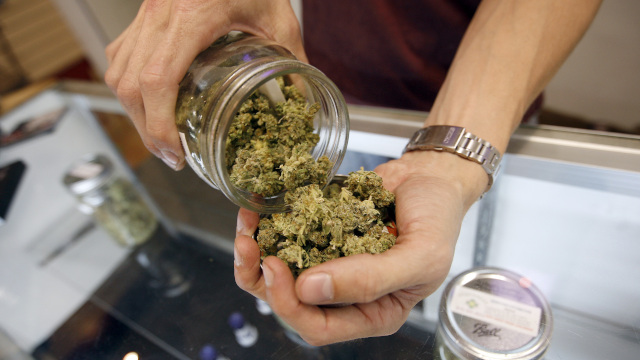Opponents countered that medical cannabis advocates are merely trying to open the way for full legalization of marijuana.
During debate on the amendment, Rep. Andy Harris (R-Maryland) read from a Drug Enforcement Administration report that called medical cannabis a mere "means to an end, which is the legalization of marijuana for recreational purposes. They did not deal with the problem of ensuring that the product meets the standards of modern medicine — quality, safety and efficacy."
Rohrabacher's amendment must pass the Senate and be signed by President Obama before it becomes law. Still, Friday's 219-189 House vote marks a sharp reversal on the issue. Six times before, the House had rejected virtually identical versions of the amendment, originally introduced in 2003 by Rep. Maurice Hinchey, D-New York. The last time the proposal came to a vote, in May 2012, it was defeated by a vote of 262-163.
Medical pot advocates celebrated the amendment's passage Friday.
"This vote is a huge victory for patients," said Steph Sherer, executive director of Americans for Safe Access, in a statement. "This is a game-changer that paves the way for much more policy change to come."
In a National Review op-ed published Thursday, Rohrabacher strikes a tone that suggests he'd like to go further than the amendment on medical marijuana. He argues that the price of continuing the war on marijuana has become too high and is especially wrongheaded in states, like California, where voters have chosen to legalize cannabis. And like other supporters of Friday's amendment, he says support for the amendment is a matter of staying true to conservative values. Summing up the cost of the war on marijuana, he writes:
The explosion of gun violence across our urban landscape, now spreading to suburbs and the countryside; our unconscionable incarceration rates; the out-of-control and unconstitutional seizure of private property on drug enforcers’ whims; the corruption and militarization of our police; the chronic despair forced on minority Americans; a monumentally dysfunctional and alienating policy toward our Latin American neighbors; and even, yes, the subtle, psychological robbery of the self-worth and self-responsibility necessary to addressing drug-related problems realistically.
This is not a proper vision of government’s role, as the late William F. Buckley Jr. and Milton Friedman, among many others, taught my generation. We constitutionalists respected the Tenth Amendment’s preference for state laws, and we trusted the moral autonomy of the individual.
The Senate is scheduled to take up the appropriations bill during the summer.
KQED’s Michael Montgomery addressed some of the issues the legislation might raise in California, particularly in light of enforcement actions here three years ago.
“It raises question about groups like Harborside in Oakland that are under a civil enforcement action,” Montgomery said. “Will they be able to target them in this way if they’re not grossly out of line with state laws? It also raises the issue – California can avoid some of these enforcement actions if it gets its act together in terms of regulations like Colorado. I think this amendment in Washington should probably compel lawmakers in Sacramento to passing some kind of a law that would set up a statewide regulatory system.”
Listen to Montgomery’s discussion with KQED’s Rachel Dornhelm:
Here's the Associated Press report on the House vote:
By Andrew Taylor
Associated Press
WASHINGTON — The GOP-controlled House voted early Friday in favor of blocking the federal government from interfering with states that permit the use of medical marijuana.
The somewhat surprising 219-189 vote came as the House debated a bill funding the Justice Department's budget.
The amendment by conservative GOP Rep. Dana Rohrabacher of California — the first state to legalize medical marijuana — came as almost half the states have legalized marijuana for medical uses, such as improving the appetites of cancer patients undergoing chemotherapy.
"Public opinion is shifting," Rohrabacher said, noting a recent Pew Research Center that found 61 percent of Republicans support medical marijuana. The numbers are higher for independents and Democrats.
"Despite this overwhelming shift of public opinion, the federal government continues its hard line of oppression against medical marijuana," he said.
Oregon Democrat Earl Blumenauer told opponents that "this train has already left the station."
Opponents said that marijuana is regulated too loosely by the states and harms the brain.
Rep. Andy Harris, R-Md., cited a recent Drug Enforcement Administration study that said that many in the medical marijuana movement are using it as "a means to an end," meaning legalization for recreational use.
"Congress is officially pulling out of the war on medical marijuana patients and providers," said Dan Riffle, director of federal policies for the Marijuana Policy Project.
The measure now heads to the Democratic Senate.
